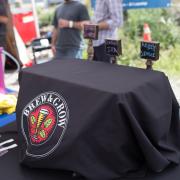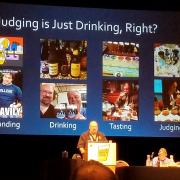Hi Everyone,
Sorry if this has already been discussed, but I'm pretty new to using forums. As a Chicago brewer I was wondering what everyone uses for water around here to get the best taste out of their beers. For my first two batches I used local Chicago tap water, but decided to use bottled spring water on my third batch. As I am about to start my fourth brew this coming weekend, and I haven't had a chance to try my last batch as it's dry hopping, I was wondering if I really need to spring for spring water (pun intended) or if the local tap water is good enough around here? Any advice to avoid off flavors and get the most out of my brew would be much appreciated.










I assume since you posted in the extract forum that you are brewing extract, and if that's the case, RO water is best since the mashing has already been done for you. However, saving some pennies and using tap water probably isn't going to really be detectable.
For all grain brewing, Chicago has pretty neutral water - it's a great base and has no chloramine. There's no reason to filter and with some easy calcs, you can tailor it rather well for what you're brewing.
Thanks Kyle. Yeah, for now I'm extract brewing as I'm pretty new to the process (only been brewing a little under two months), but wanted to make sure I'm not changing the flavor of the beer too much by using tap water. Sounds like Chicago has some good H2O for making some cold ones though. Might try to save myself a few bucks by brewing with tap and then topping it off with RO water when transfering to the carboy.
I've brewed extract for a long time and Chicago water is a great "base". It's clean, balanced (not to hard or soft) and just good for beer.
If you're doing a really light beer, add 2 gallons of distilled water to the mix, if you're doing an english beer or malty beer... add a tablespoon of baking soda to the start of the boil. If you're doing a hoppy a beer... don't worry about it. Hops cover a lot. ;) Good luck man, glad to have you at the club.
Kris, baking soda is sodium bicarbonate. For malty beers, it is canonically advisable to add some calcium chloride.
For hoppy beers, your mineral of choice should be calcium sulfate, or gypsum. Both of these are available at brew and grow for pennies.
Thanks Kris/Boolish. It's good to know I can add a little something extra to the brewing process to help out the flavors of different varieties of beer.
MAC, if you're interested in water adjustments, there are a number of free online calculators that can give you guidelines to your water based on style and source profile.